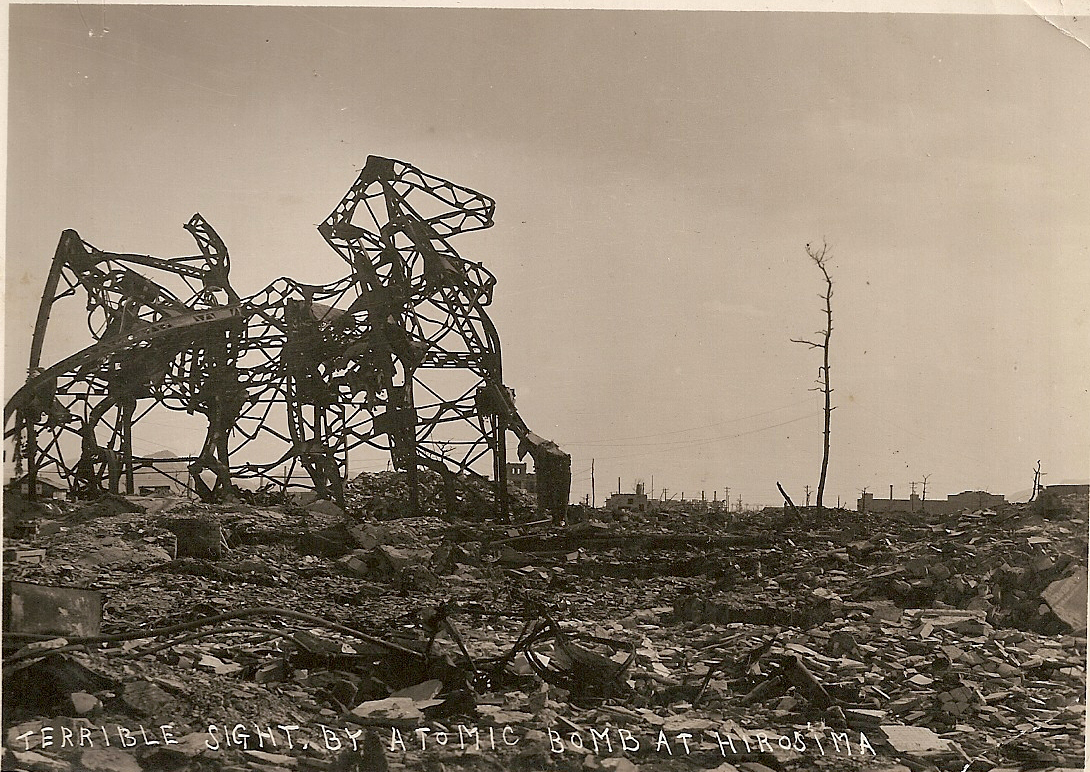
Hiroshima after the bomb Adam Tibalis' grandfather via Flickr (Creative Commons licensed) / Adam Tibalis' grandfather via Flickr (Creative Commons licensed)
Editor's note: On Aug. 6, 1945, the United States dropped an atomic bomb on the Japanese city of Hiroshima—the first time a nuclear weapon had ever been used for warfare. Just three days later, the U.S. dropped a second bomb on Nagasaki. More than 200,000 people were killed in Hiroshima and Nagasaki. Radiation from the bombings continued to claim lives in the decades that followed, causing birth defects and other health issues among their children.
In 2015—the 70th anniversary of the bombings—survivor Michiko Kodama wrote this powerful account and called for abolition of what she calls, "weapons of the devil." - Lucy Duncan, AFSC
I am a Hibakusha, a victim of the first nuclear war in history. The atomic-bomb attack was made on Hiroshima in 1945. At that time, I was 7 years old, a second grader in primary school.
At 8:15 am on August 6, 1945, I was inside the wooden school building. Suddenly, I felt a blinding flash. The next moment, the ceiling of the building collapsed and sharp splinters of windowpanes flew all around. They stuck into the walls, desks, and the floor of the classroom and also into my skin. I fell unconscious and don’t remember how much time passed before I came to my senses.
My father managed to come to the school to find me. On my way home, carried on my father’s back, I witnessed hell on earth. I saw a man with his skin burned heavily and peeling. A mother was carrying a baby, which was burned-black and looked like charcoal. She herself was heavily burned all over her body and was trying to flee from the place, almost crawling on the ground. Others lost their sight, their eyeballs popped out, or ran around trying to escape, while holding their protruding intestines in their hands. More and more people tried to cling on to us, saying, “Give me water, water, water…” Unable to give any kind of help to them, we just left them there and hurried home.
When I arrived home, 3.5 kilometers from the blast center, I found the roof of the house blown away by the blast and fragments of glass scattered all around. The “Black Rain,” containing large amounts of radiation, fell into the house, and traces of the “Black Rain” on the wall remained for a long time.
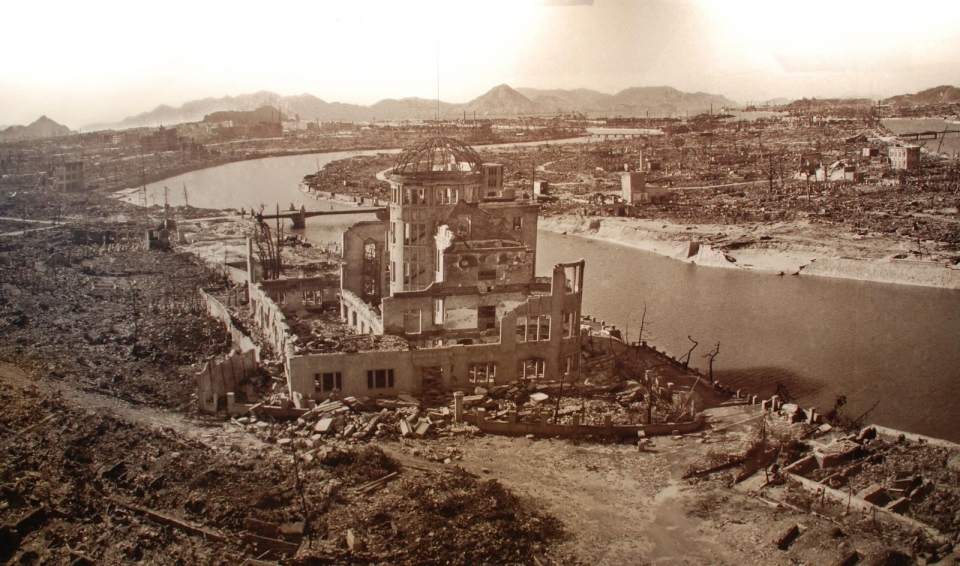
My favorite cousin, who was like a big sister for me, had been mobilized to work around the area 500 meters from the blast center when the bomb exploded. While half of her face, her entire back, and her right leg were severely burned, sore and raw, she escaped to my home. Her burns quickly festered and flies swarmed. Soon maggots bred and crawled around all over her body. All I could do for my beloved cousin was pick these maggots out and wipe her oozing body. I remember that on the morning of the third day -- probably it was August 9th -- she breathed her last breath in my arms. She was 14 years old.
Another cousin, who was 10 years old, was suffering from diarrhea, although he had no injuries or burns. One day he began to bleed from his ears and nose, vomiting blood clots from his mouth, and dying suddenly. One after the other, several of my uncles and aunts followed my cousins within a matter of a month.
The atomic bomb continued to afflict me in my later life. Whenever I tried to get a job or get married, I suffered from prejudice and discrimination just because I was a Hibakusha. When I became pregnant, I was tremendously worried, wondering if I would give birth to a baby who would be seen as a Hibakusha’s child. Around that period, many Hibakusha suffered repeated stillbirths and miscarriages, or lost their children prematurely due to illness.
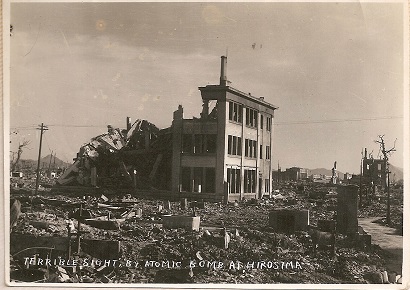
It is most painful for me now to speak about my daughter. She was suddenly taken with cancer. She made a tearful and difficult decision to undergo a major operation, believing that it would make her healthy again. After the 13-hour operation, in fear of the recurrence or metastasis of cancer, she was going through the treatment and rehabilitation, despite great physical and mental pains. But she died abruptly, only 4 months after she was first diagnosed.
When I got pregnant with her, after much wavering over the possible radiation effects on the baby, I finally decided to give birth to her, so her death 4-and-a-half years ago has given me deep sorrow and vexation. I really miss her, and I want to hear her voice and hug her in my arms.
It is still not proven whether second generation Hibakusha are more likely to suffer cancer or not. But it is clear that radiation does affect the human genes, which is a cause for big anxiety among second and third generation Hibakusha.
The aftereffects of the atomic bomb continue to bring hardships to the survivors throughout their lives, physically, mentally and in their living conditions, after even 70 years.
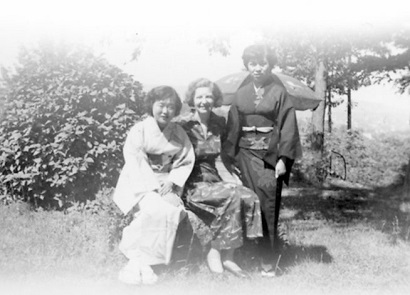
Such experiences as ours should never be inflicted on any of you, nor on anyone in the world. Out of our own experiences, the Hibakusha know that nuclear bombs would cause untold damage to human beings if they would ever be used again either on purpose or by accident.
We urge world leaders, especially of the nuclear-armed states, to come to Hiroshima and Nagasaki and witness directly the atrocity committed on these two cities. They believe it necessary to maintain nuclear weapons in the name of nuclear deterrence. But deterrence is based on the probability of actual use of these weapons. Hibakusha absolutely cannot accept either the threat or any probability of the use of nuclear weapons. They are weapons of the devil which cannot coexist with humans.
The mere existence of nuclear weapons on this planet is not acceptable from the humanitarian point of view.
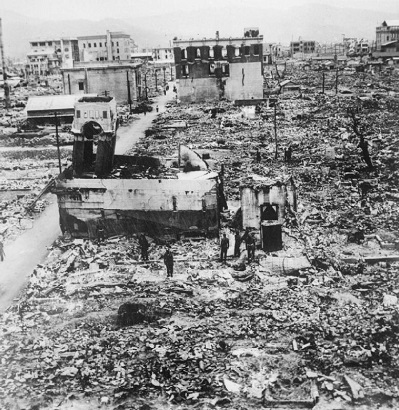
Ever since its founding in 1956, for more than half a century, Nihon Hidankyo (The Japan Confederation of A- & H-Bomb Sufferers’ Organizations) has called, “No more Hibakusha,” and “Abolish nuclear weapons!” while tearfully sharing their A-bomb experiences with people in Japan and also internationally. Hibakusha are now very encouraged by the increasing efforts of the people to achieve the abolition of nuclear weapons. With this support, we are determined to work further to testify and disseminate information about the consequences of the A-bombing to the broader public.
However, the world is still burdened with more than 16,000 nuclear weapons, most of which are possessed by the United States and Russia.
Dear conscientious people of the United States, please try to learn what actually happened under the mushroom cloud, and the atrocious and inhuman damage that was caused by the atomic bombs. Once you know it, you will understand that nuclear weapons must never be used and should immediately be abolished.
Before the 70th anniversary of the atomic bombing, international conferences on the humanitarian impact of nuclear weapons were held in Norway, Mexico and Austria. The Chair’s Summary from the conference in Mexico in 2014, in which 146 countries took part, said, “…the mere existence of these weapons (is) absurd, ...and ultimately are contrary to human dignity,” and declared that the time has come for action for abolishing nuclear weapons, and for this we must “reach new international standards and norms, through a legally binding instrument.”
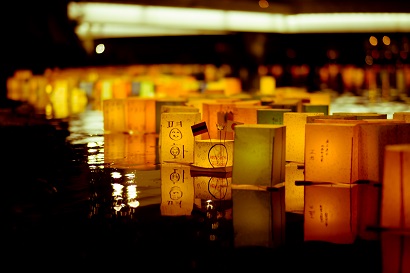
It was really regrettable that the 2015 NPT Review Conference, held in the 70th anniversary year, ended without agreeing on the final document. We the Hibakusha urge the leaders of the nuclear weapons states to listen to the heartfelt appeal of the Hibakusha, calling for “No More Hibakusha."
We will never give up. We are witnessing a great surge of international opinion calling for a world free of nuclear weapons. Over 80% of the members of the United Nations have agreed that it is in the interest of the humanity that nuclear weapons never be used, and that the only guarantee for this will be the abolition of nuclear weapons.
In order to support this move and make the process move forward, each and every citizen of the civil society should be firmly committed to creating a world free from inhumane nuclear weapons. I sincerely invite you to step boldly forward together.
Although we the Hibakusha are aged, as long as we breathe, we will continue to appeal for the abolition of nuclear weapons, working in partnership with civil society around the world.
No more Hiroshimas and Nagasakis! No more Hibakusha. No more war.